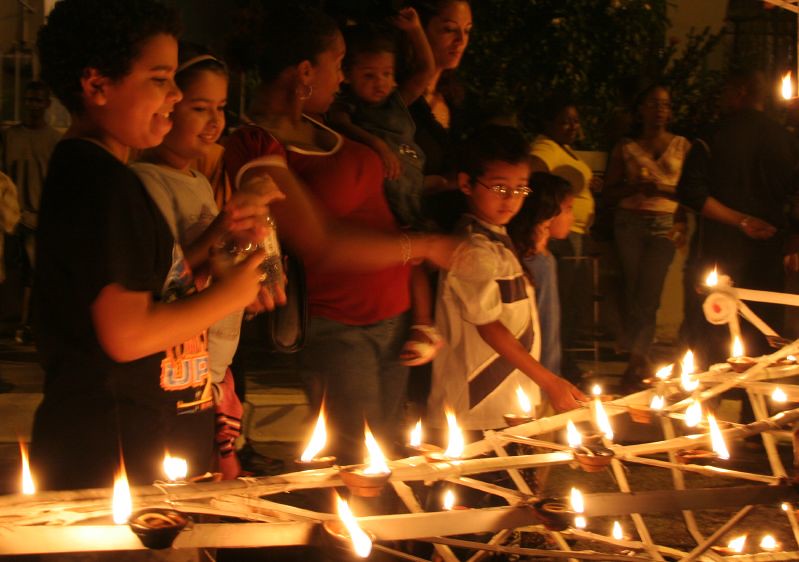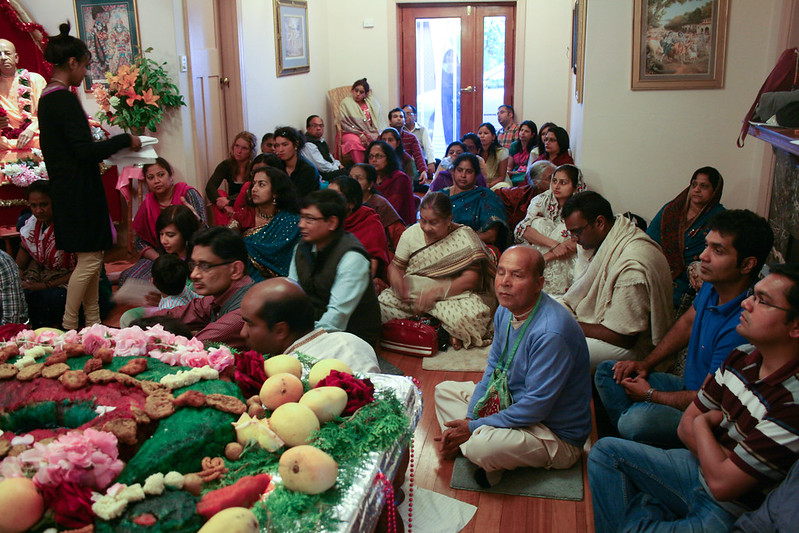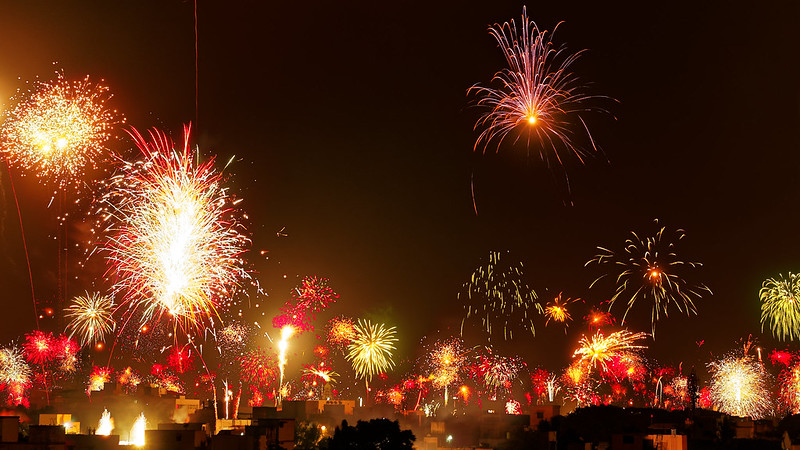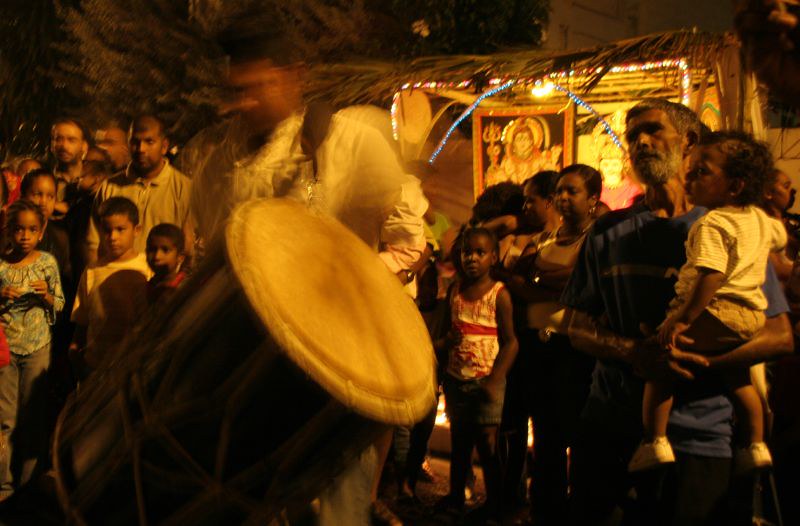Diwali
India’s Grandest Festival of Light and Joy
2026/11/07 - 2026/11/12
Diwali is one of India’s largest Hindu festivals, celebrating the victory of light over darkness and new beginnings.
Every autumn, all across India, Diwali transforms the country into a dreamlike world of light. For five days, cities and villages alike are illuminated by countless diyas (oil lamps) and candles, fireworks light up the night sky, and the air is filled with the scent of incense, sweets, and the laughter of families. From the bustling streets of Mumbai to the holy city of Varanasi and the smallest rural villages, Diwali is a festival where everyone-locals and travelers alike-joins in celebrating the triumph of good over evil. It is India’s biggest and most inclusive celebration, shared with family and friends.
Markets overflow with flowers and sweets, and colorful rangoli (traditional patterns made from powders or flower petals) decorate doorways. Diwali is a festival that delights all five senses. People from around the world gather, drawn by the warmth and energy of what is truly one of the most spectacular and welcoming festivals on Earth.
Main Attractions
Five Days of Rituals and Festivities
Diwali unfolds over five days, each with its own special traditions. The first day, Dhanteras, is for cleaning the house and buying gold or new utensils to invite prosperity. The second day, Naraka Chaturdashi (Choti Diwali), features early morning baths and the lighting of the first lamps. The third and main day, Lakshmi Puja, sees families dressed in their best, performing rituals to welcome Lakshmi (the goddess of wealth) and lighting diyas throughout the home. The fourth day, Govardhan Puja/Annakut, involves offering mountains of food to Krishna at temples. The fifth day, Bhai Dooj, celebrates the bond between brothers and sisters with special prayers and gifts.
Homes Aglow: Light, Rangoli, and Fireworks
Everywhere you go, homes and temples are illuminated with countless diyas and candles, and colorful rangoli decorate doorways. At night, the sounds and scents of fireworks, incense, and music fill the streets. Many cities hold large fireworks displays, and rivers and lakes are dotted with floating lamps.
Costumes and Decorations
Diwali is traditionally celebrated in festive attire. Women wear vibrant sarees, lehengas, or anarkali suits adorned with embroidery, beads, and jewels, while men dress in kurta pajamas or sherwanis. Homes are decorated with marigold garlands, mango leaves, and strings of lights, creating a warm and festive atmosphere.
Traditional Food & Drink
Food is at the heart of Diwali! Families prepare mountains of sweets like gulab jamun, jalebi, badam halwa, gajar halwa, ladoo, barfi, and kheer, along with snacks such as samosas, onion bhaji, masala peanuts, paneer tikka, and dal makhani. Festive drinks like masala chai and badam milk, rich with spices, add to the celebratory mood.
Cultural and Historical Background
Diwali’s origins are ancient, with references in pre-Vedic times and classical Sanskrit texts such as the Padma Purana and Skanda Purana. It began as an autumn harvest festival, with people whitewashing their homes and lighting oil lamps (diyas) to pray for abundance, prosperity, and to ward off evil. Over time, these customs spread to Hinduism, Jainism, Sikhism, and some Buddhist communities, each adding their own legends and meanings.
In Hinduism, Diwali commemorates the return of Prince Rama to Ayodhya after 14 years in exile and his victory over the demon king Ravana, as told in the Ramayana. People lit lamps to celebrate Rama and Sita’s return. It is also a day to welcome Lakshmi, the goddess of wealth, into clean, well-lit homes. In Jainism, Diwali marks the nirvana (liberation) of Mahavira. Sikhs celebrate the release of the sixth Guru, Hargobind, from Mughal imprisonment (Bandi Chhor Divas). Some Buddhists (Neo-Buddhists) also celebrate Diwali as a symbol of social equality and liberation, inspired by Ashoka and Dr. Ambedkar.
Diwali is also a time to strengthen family and ancestral bonds and pray for happiness, prosperity, and health in the coming year. Lighting diyas symbolizes the universal message that light triumphs over darkness, wisdom over ignorance, and hope over despair-a message that resonates not only in India but around the world.
Participant Voices
As a foreigner, I participated in Diwali for the first time. Invited to a friend’s family home, I was welcomed by vibrant marigold garlands and rangoli at the entrance, and the entire house was filled with the sweet aroma of spices and incense. In the kitchen, the mother patiently taught me how to roll ladoo dough, and as I dusted my hands with flour, I felt myself becoming part of the family circle. In the evening, everyone changed into sarees and kurtas, and we climbed to the rooftop to watch fireworks bloom in the night sky. Surrounded by laughter and greetings of “Happy Diwali!”, I felt wrapped in a sense of irreplaceable happiness, as if I had become part of this warm, extended family.
Fun Facts
- Diwali is celebrated by over a billion people in India and around the world, making it one of the world’s largest festivals.
- More than 100 million diyas (oil lamps) are lit across India during Diwali.
- Diwali is also India’s biggest shopping season for gold, clothes, and sweets.
Festival Dates
Diwali is celebrated across India and in Indian communities worldwide, centered around the new moon night of the Kartika month. For the best experience, visit during the festival to witness the lights, prayers, family puja, and the colors, flavors, and warmth of India’s “Festival of Lights.”
The event schedule is subject to change. Please check the official website for the most up-to-date information.
Information
| Name | Diwali |
| Country | India |
| Area | New Delhi |
| Date | 2026/11/07 - 2026/11/12 |
| Link |
Upcoming Festivals
Kukeri(Surva) Bulgaria
Bulgaria’s Festival of Spirits, Fire, and Bells That Drives Away Winter
2026/01/22Dinagyang Philippines
Iloilo’s Thunderous Festival of Faith, Tradition, and Dance
2026/01/22The Northern Lights Festival (Nordlysfestivalen) Norway
A Tromsø Miracle: Music and Aurora Dancing in the Arctic Night
2026/01/25Carnavales de Ituren y Zubieta Spain
Ancient Echoes and the Festival that Awakens Spring in the Basque Mountains
2026/01/26Up Helly Aa United Kingdom
A Night When Fire and Viking Pride Blaze in Shetland
2026/01/29Winterlude Canada
A Wonderland of Ice, Light, and Smiles in Canada’s Capital Region
2026/01/30Carnival of Viareggio (Carnevale de Viareggio) Italy
A Spectacular Parade of Giant Papier-Mâché Masterpieces
2026/01/30Fiesta de la Candelaria(Virgin of Candelaria) Peru
A Grand Dance Festival of Faith and Folklore Echoing on the Shores of Lake Titicaca
2026/01/31Thaipusam Malaysia
A Pilgrimage of Prayer and Penance Illuminates Batu Caves
2026/01/31Jaisalmer Desert Festival India
When Rajasthan’s Golden Dunes Dazzle with Color and Culture



